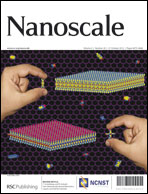Magnetic resonance imaging (MRI) yields high spatially resolved contrast with anatomical details for diagnosis, deeper penetration depth and rapid 3D scanning. To improve imaging sensitivity, adding contrast agents accelerates the relaxation rate of water molecules, thereby greatly increasing the contrast between specific issues or organs of interest. Currently, the majority of T1 contrast agents are paramagnetic molecular complexes, typically Gd(III) chelates. Various nanoparticulate T1 and T1/T2 contrast agents have recently been investigated as novel agents possessing the advantages of both the T1 contrast effect and nanostructural characteristics. In this minireview, we describe the recent progress of these inorganic nanoparticle-based MRI contrast agents. Specifically, we mainly report on Gd and Mn-based inorganic nanoparticles and ultrasmall iron oxide/ferrite nanoparticles.
You have access to this article
 Please wait while we load your content...
Something went wrong. Try again?
Please wait while we load your content...
Something went wrong. Try again?


 Please wait while we load your content...
Please wait while we load your content...